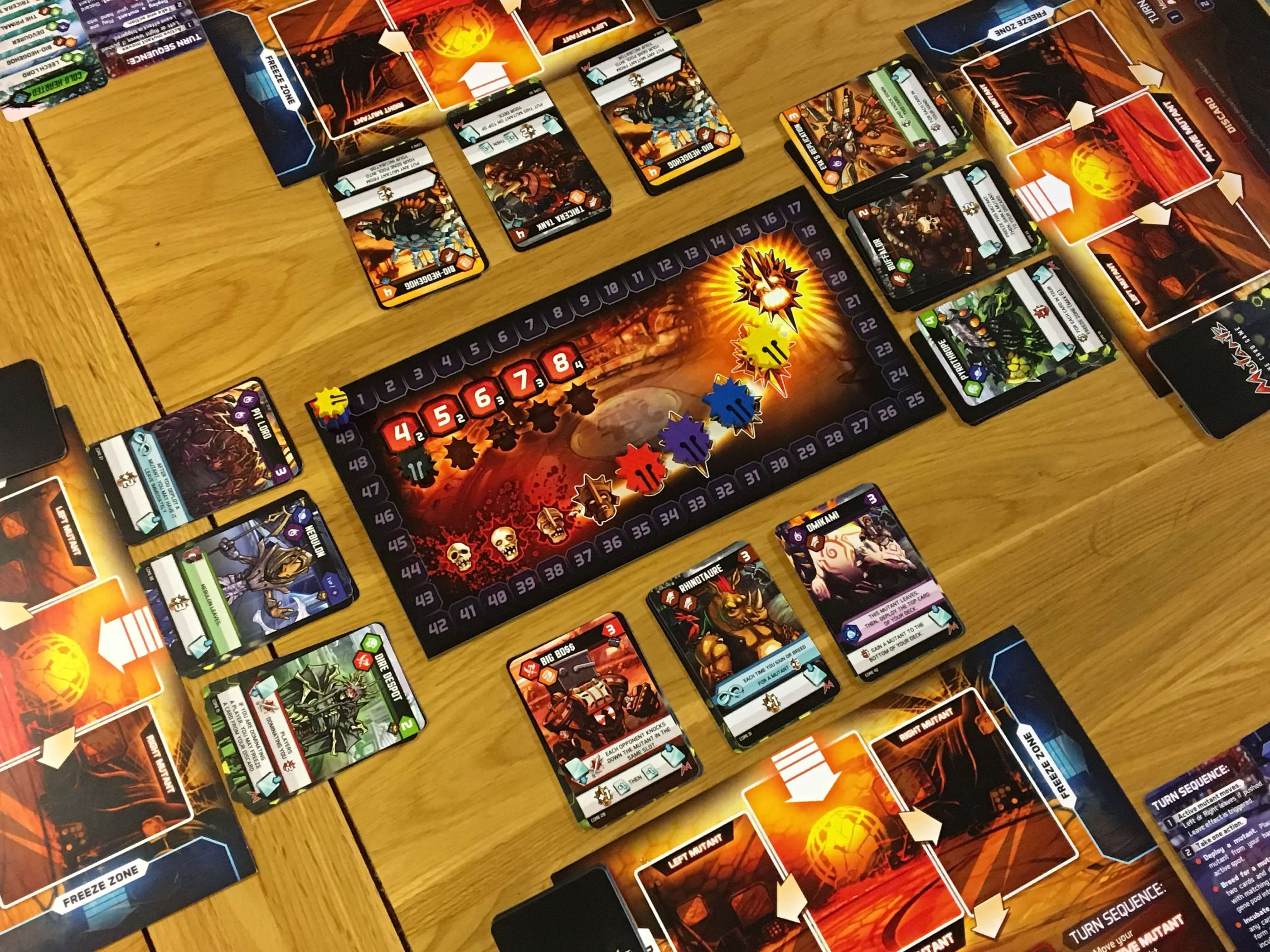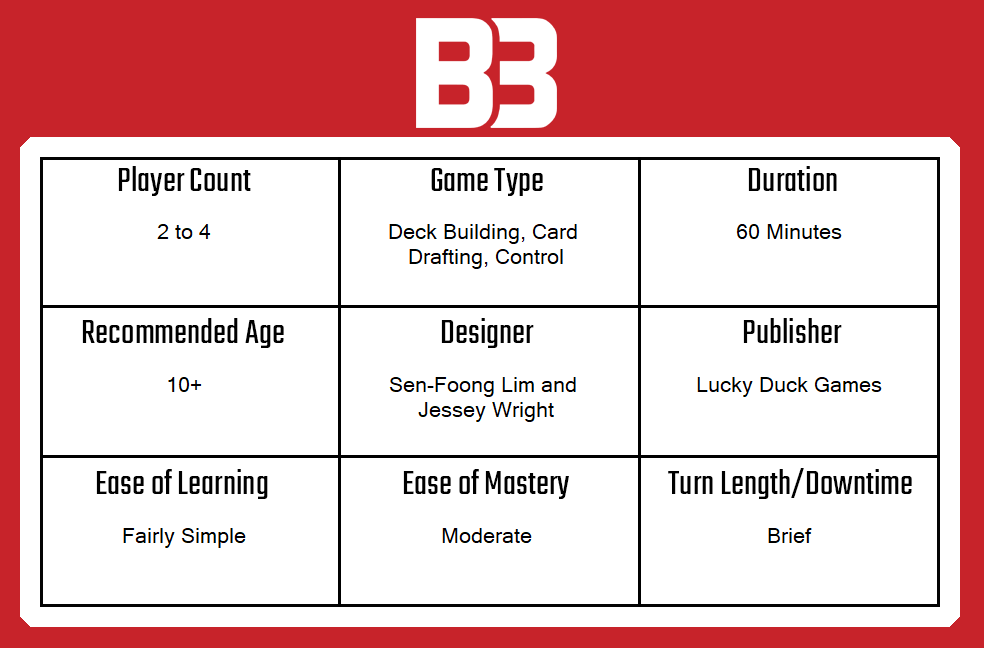Mutants: Genetic Gladiators Kickstarter preview — DNA dominance
If you’re in the market for a fast paced, straightforward deck-building game with a bright, colourful theme and a lot of personality, then Lucky Duck Games’ Mutants: Genetic Gladiators might be of interest to you. It might be familiar too, since Mutants was originally released as a mobile phone and Facebook game. With four prebuilt decks and a number of drafting modes to enable broad replayability, there’s a lot to sink your second (or third) row of teeth into.
Overview
Mutants is a two to four player game that supports using a central board to represent relative player strength as well as a series of player boards that each represent an individual player laboratory. The aim of the game (broadly speaking) is to increase your power level over the other players in each of five rounds. When a round ends, all players (except last place) will usually score, then the most powerful player will move to the back of the power track for the start of the next round.
Players will use the genetic properties of the creatures in their starting hand to draw new, more powerful creatures from three gene pool stacks that are set up at the beginning of the game. These creatures, in turn, will ultimately be bumped out of the lab, often triggering powerful effects such as knocking down (flipping) an opponent’s creature or adding two to the power level of the player that controls them. Most creatures can be frozen either at this point or as the result of another effect, which permanently removes them from that players deck. Instead, freezing cards adds additional victory points at the end of the game, which can make it a very valuable strategy.
Aside from knocking down, there are a number of ways in which the players can interact with one another’s board, but Mutants isn’t the kind of card game that features pitched battles between the titular monsters. Instead, the action is fairly indirect and feels much more about focusing on your own plan, to later, occasionally disrupt those of others when it is opportune to do so. With that said, ignore the power track at your peril, since any player who gains the top space will be able to force others down it and, may potentially end the round early, which affords them a huge swing in points.

Components
The copy of Mutants that I’ve been previewing may be, by no means, representative of the final production copies, but if it’s anything to go by, then the retail copies should be exceptional. The build quality is exactly what you should expect from a modern deckbuilding game — the cards are of standard size and thickness and there’s no reason to think that they will wear out unduly quickly. Both the central board and each of the player boards are even more robust, with a thick, hard cardboard construction. The wooden tokens that sit on them are colourful, though I don’t see how the central board art (or the tokens on it) tie in thematically to the game itself.
The theme of Mutants is certainly carried through in the artwork, which is bright and highly distinctive. Despite some fairly questionable names, each mutant character has a personality that is delivered entirely through just two things; the artwork and the attributes. There’s no flavour text or written content, yet each of the creatures manages to achieve a level of character based almost solely on how it looks. It’s an incredible achievement really, and I think that it’s only made possible thanks to that fantastic comic book look.
Interestingly, whilst the printed manual that I received looked fine and had all of the appropriate sections, rules and examples, I was advised that it had been updated during my time with the review copy. As such, I’ve been using a digital manual (which I assume will become the printed version) and I can confirm that it is entirely functional. Whilst it isn’t a component, as such, I should also mention that Lucky Duck Games has already released a number of set ups and lets play videos which I would recommend you check out in order to learn the game and understand it at a glance.

Turn Structure
On that note, if you’d prefer to endure my stumbling description of how turns in Mutants unfold, then I certainly won’t begrudge you staying here with me. Turns in Mutants are very simple, although I’d be surprised if you said that you’d played a game quite like it before. The first phase of every turn is what is called “Crush the Competition” and basically it only happens if your power marker is at the very top of the track and every other player is in the red zone — this only happens when your power increases when you are at the top of the track and they are pushed down. Since this phase happens at the beginning of your turn, it also requires that the other players don’t increase their power at all on their turn, which is something that they would never do knowingly.
The next phase is simply to move your active mutant. The active mutant is always in the middle of the player board and, at this point, they will move to either the left or right slot beside them. If only one slot is free then that’s the one they’ll move to, or if both are free, the player can choose. As the game progresses, the likelihood is that both left and right slots will be filled, in which case the player can choose one of other of the mutants to leave the battlefield to make space. At this point, the exiting mutant will activate its leave ability (if it has one) which might be to freeze itself, knock down an opponent, add power or something similar.
With their active mutant slot now free, the player is able to take their main action. Broadly speaking, this will usually be to either play a mutant directly from their hand onto the active mutant slot, or to discard two mutants, match the DNA sequence symbols on them to one of the advanced mutant cards that sit above their board, then place it into the active mutant slot. This second method is how the player expands their hand in Mutants, so it’s a solid early game strategy.
Wherever the newly placed mutant comes from, it may or may not have an enter the battlefield ability that will now trigger. Should a player find themselves struggling (in particular for DNA) then she may simply incubate an advanced mutant by placing it to the left side of her board at a cost of discarding any other card (with no worries about the DNA shown.) This mutant will only be added to the players deck at the end of the next round (not the next turn) so whilst the wait is long, it’s an efficient strategy for at least the first round or two, whenever you have a card that would otherwise be useless in your hand.
The action in Mutants is really all about the enter and leave abilities, since they influence the other players board states and increase (or decrease) your power level. Essentially then, the name of the game is all about manipulating the board state on a turn by turn basis through these abilities until the round ends. Usually, this is because all players run out of cards. At this point, the players score based on their final positions on the power track, but the player boards are left as is, with the mutants who are on them left as they are. The least powerful player is now moved to the front on the power track, with the second least powerful player next and so on. The round marker advances, incubated mutants are placed on the top of their owners decks and six cards are drawn, then play continues.
Final scoring takes place at the end of five rounds of play, with the only difference at the end of the game being to add the total points value of frozen mutants to the value provided by the positions on the power track. There’s no doubt that the power track provides the majority of points (especially if someone does manage to Crush the Competition) but the frozen creatures can absolutely swing the tide of a closely fought race, so ignore them at your peril.

Game Experience
Mutants is a fast, fun and reasonably strategic game that rewards experience, experimentation and patience. Aside from the four basic decks that the game recommends players choose from (pictured), Mutants also comes with a fair selection of additional advanced mutant cards, which also come complete with a number of variant modes. I’ve explained the actual game structure here, but what I won’t go through in detail are the various draft and alternative modes. Needless to say, they do exist and they add a lot of variety to the game. This is one of those games that I could imagine my teenage self falling in love with and exploring every angle of.
Aside from the pre-configured standard game, Mutants is probably most exciting when the draft variant is introduced. This requires a bit of experience, but much as the draft is an important part of the actual experience in games like Magic: The Gathering, so too is it in Mutants. I do still need to explore it further, but being able to draft (and hate draft) changes the game dramatically and essentially splits the game into two separate (and equally interesting) parts — the draft and the actual core game. I suspect further expansions will be introduced to expand Mutants in the future, but even based on what I’ve played, it’s a generous box of stuff to say the least.
In terms of how Mutants actually plays, I find it an exciting mix of managing both immediate benefits and long term payoffs. Decisions are plentiful — is it best to target a high power strategy that locks out the opposition on the power track, or should you focus on disrupting the plans of others? Is incubating now the right play?,Maybe the time penalty of essentially wasting a turn is too much of a risk. It may (and does) look like a cute, cartoonish affair, but Mutants is much more complex and intriguing than you might think.

Conclusion
Given that it is still in development and may improve, Mutants is very impressive. Based on Lucky Duck Games’ past efforts the Kickstarter is likely to result in a number of additional stretch goals and other benefits that I haven’t been able to see. Even if such expansions don’t become available immediately, I have a feeling that Mutants is a highly expandable game that is likely to see future support, as long as the Kickstarter succeeds.
It takes quite a bit of careful thought and design flair to improve upon the basic drafting and deck building approach that so many other games have taken, yet I do think that Mutants does it. It’s easy to pick up and quick to teach, but it’s very hard to master and just when you think you have, new and more complex variants can be introduced to test your skill. I like how Mutants challenges players with both its mechanics and its components and whilst I think that creating expansion content will be tempting for Lucky Duck Games, I don’t think they’ve been at all stingy with what is in the core box. A recommended Kickstarter for fans of deck builders and standalone drafting games.
A copy of Mutants was provided for review purposes. You can find out more about it on the website of publisher Lucky Duck Games.

Comments are closed.